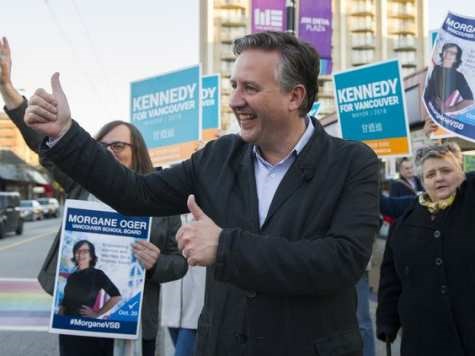VANCOUVER — Kennedy Stewart will be the next mayor of Vancouver, after winning a nail-biter of a race.
It was well past midnight before the final results came in, after Stewart had been neck-and-neck with Non-Partisan Association candidate Ken Sim all evening.
Stewart, an independent candidate, finished with 28.72 per cent of the vote, barely ahead of the NPA’s Sim with 28.15 per cent of the vote, with all 133 voting places reporting. For much of the night, the two front-runners exchanged leads and remained within a percentage point or two of each other.
Shauna Sylvester, another independent, followed in third with 20.49 per cent of the vote.
Polls closed at 8 p.m. Saturday, but anyone waiting in line at that time was allowed to vote. Some polling stations had long lines, which delayed the vote counting.
The top three were followed, at deadline, by Coalition Vancouver’s Wai Young with 6.55 per cent, YES Vancouver’s Hector Bremner with 5.65 per cent, Vancouver 1st’s Fred Harding with 3.13 per cent and ProVancouver’s David Chen with 2 per cent.
The most recent Research Co. poll of the mayoral race had showed Stewart out ahead with 36 per cent of decided voters indicating their support for him. That poll, released Tuesday, showed Sim in second with 23 per cent, with Sylvester following close behind, within the margin of error, at 19 per cent.
This week’s poll showed support increasing for all three of those three front-runners, while each of the next four mayoral candidates dropped further behind: Bremner and Young both fell to six per cent, while Harding and Chen both dropped back to two per cent.
Non-Partisan Association supporters packed into the ballroom at the Coast Coal Harbour Hotel from the early evening, nibbling canapés and sipping cocktails as they awaited the results.
Members of the crowd packed around a projector screen excitedly when the first numbers of the evening put Kennedy Stewart and Ken Sim within 60 votes of one another, and some clapped briskly when five of their councillors graced the initial cut on council.
But as more voting stations reported their results, and Sim fell behind by the narrowest of gaps, the tone of the room started to shift.
“This is so tight. Oh my God,” one supporter said to nobody in particular.
“Crazy. Crazy,” remarked another.
Meanwhile across town at Stewart’s event at the Waldorf Hotel on East Hastings, supporters cheered the early results showing their candidate in the lead, and then gasped as later results showed Sim edging into the lead. When the last results came in around 12:45 a.m., Stewart still had yet to make an appearance at his event.
Saturday also marked the end, at least for now, of the Vision era in Vancouver. After enjoying a majority on council for a decade, Vision Vancouver saw its electoral fortunes fade this year. After outgoing three-term Vision Mayor Gregor Robertson announced, in January, that he would not seek a fourth term as mayor, Vision publicly floated the idea of not running a mayoral candidate and instead supporting an independent or another party’s candidate.
But, to the frustration of some of the city’s left-leaning voters and candidates, the party eventually announced they planned to run a mayoral candidate, and then in June, acclaimed Ian Campbell as their nominee. But after months of campaigning, Campbell withdrew from the race suddenly in September.
Vision entered the week with no mayoral candidate and five council candidates, but that changed on Friday, as the party announced they were revoking their endorsement for council candidate Wei Qiao Zhang for undisclosed reasons. That left four Vision council candidates on the ballot, and, at deadline, not one of them, including incumbent Coun. Heather Deal, appeared likely to win one of the 10 council seats.
At deadline, it appeared the city’s 10 council seats would go to a mixed group, with five NPA candidates sitting in the top 10, three Greens, and one apiece from COPE and OneCity. If that result were to hold, it would mean a Sim mayoralty, were he to win, gives the NPA a sixth vote and a majority on council.
It was, in many ways, a Vancouver election unlike those that came before it.
This year’s municipal elections were the first to take place after the B.C. NDP enacted new campaign finance rules, banning corporate and union donations and setting strict donation limits of $1,200 per donor.
The rules applied to the entire province, but nowhere was the change as significant as in Vancouver, the province’s largest city, where the two biggest parties, Vision and the NPA, raised and spent millions in recent elections, largely funded by wealthy individuals, real estate companies and unions. In the 2014 election alone, Vision raised $2.9 million and spent $3.4 million, setting the city’s record for both the most expensive campaign and biggest deficit.



